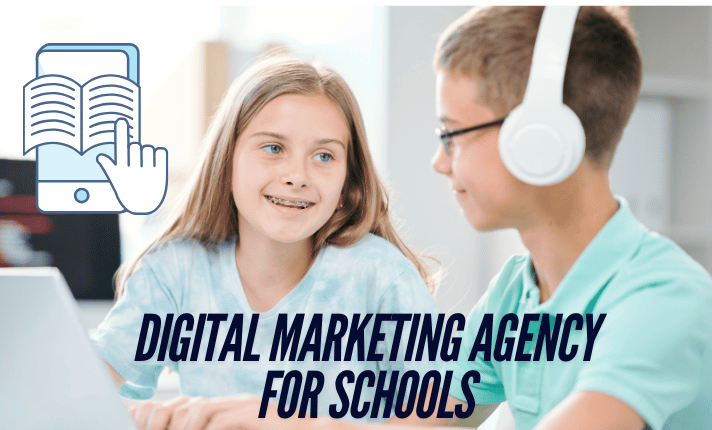Attracting students and building a strong online presence are essential for private and public schools today. A digital marketing agency for schools offers targeted strategies that help institutions engage with students and parents effectively, build trust, and grow their reputation. This guide outlines key strategies to enhance your school’s online visibility and enrollment through focused digital marketing efforts.
1. The Importance of Digital Marketing for Schools
Schools operate in an increasingly competitive environment, making it crucial to connect with parents and students online. Digital marketing bridges the gap by:
- Digital marketing bridges the gap by:
- Improving visibility through SEO and content marketing See our guide on What are some SEO tips for private schools? Engaging parents on social media platforms Building trust through online reviews and testimonials Driving enrollment with paid advertising campaigns.
- Engaging parents on social media platforms
- Building trust through online reviews and testimonials
- Driving enrollment with paid advertising campaigns
2. SEO Strategies to Improve School Visibility
SEO (Search Engine Optimization) ensures your school ranks high in search results when parents look for educational institutions.
- Local SEO: Optimize your Google Business Profile with accurate contact details and photos. Use keywords like “trade school near me” for better targeting.
- Topical Authority: Publish blog posts and guides on relevant topics like admissions tips and the benefits of private education. This positions your school as a thought leader.
- Internal Linking: Use internal links between blog posts, admissions pages, and events to keep users on your site longer. For example, schools offering programs like sports management can benefit from linking to a sports management guide to improve the relevance of your content.

3. Create Content to Engage Your Audience
Content that resonates with parents builds trust and encourages them to enroll their children. Focus on:
- Student success stories: Inspiring narratives highlighting the achievements and experiences of students at the institution.
- Virtual campus tours: Interactive online experiences that allow prospective students to explore the campus, facilities, and student life from the comfort of their own homes.
- Blog posts answering common questions (e.g., “How private schools prepare students for the future”)
- Highlight academic achievements, extracurricular activities, and community events through blogs and videos.
4. Utilize Paid Advertising for Immediate Results
Paid ads, especially on Google and Facebook, allow schools to reach parents quickly. Retargeting ads ensure that users who visited your site are reminded to engage again. Research shows that users need to see an ad seven times before taking action (Forbes).
5. Landing Page Optimization for Higher Conversions
Every marketing campaign should drive users to a well-designed landing page. Studies show that optimized landing pages can boost conversions by up to 300% (HubSpot). Ensure your landing page:
- Has a clear call-to-action (e.g., “Book a Campus Tour”)
- Loads quickly and looks good on mobile devices
- Features testimonials and contact forms
6. Use Social Media to Build Community
Social media platforms such as Facebook, Instagram, and LinkedIn are powerful tools for engaging parents and students.
- Share success stories and event highlights.
- Create community groups for parents to interact with teachers and staff.
- Use targeted ads to promote enrollment events.
7. Gather and Showcase Online Reviews
Parent testimonials and online reviews boost trust and influence decision-making. Encourage satisfied parents to leave positive reviews on platforms like Google Business Profile. According to research, 70% of marketers cite poor targeting as the biggest reason for underperforming campaigns (WordStream).
8. Optimize for Mobile Users
A majority of parents research schools on their phones, making mobile optimization crucial.
- Use responsive design to adapt your site to any screen size.
- Test your site’s speed using the Google Mobile-Friendly Test.
9. Monitor Performance Using Analytics
SEO and marketing campaigns need regular monitoring to ensure they’re working. Use tools like Google Analytics and Google Search Console to track:
- Organic traffic and keyword performance
- Page bounce rates and session durations
- Conversion rates from landing pages
These insights allow schools to refine their strategies continuously.
10. Align Digital Efforts with E-E-A-T Guidelines
Google values content that reflects Experience, Expertise, Authoritativeness, and Trustworthiness (E-E-A-T). Schools can build E-E-A-T by:
- Publishing high-quality content that demonstrates their educational philosophy and values
- Adding bylines and author bios to blogs, especially from teachers or staff
- Showcasing media coverage or awards that highlight the school’s achievements
Check Google E-E-A-T) updates for more insights on this google update.
FAQs: Digital Marketing for Schools
1. How Does SEO Help Schools Attract Students?
SEO increases visibility by ensuring the school ranks for relevant search queries, such as “private school near me.”
2. Why Are Reviews Important for Schools?
Reviews build trust with prospective parents and influence enrollment decisions. Positive reviews also enhance local SEO.
3. Should Schools Invest in Paid Ads?
Yes. Paid ads offer immediate visibility and complement SEO efforts by targeting parents who are actively searching for schools.
4. How Can Schools Track Marketing Success?
Use Google Analytics and Search Console to monitor web traffic, engagement, and conversions from your campaigns.
Conclusion: Build a Strong Digital Presence
Partnering with a digital marketing agency for schools ensures that your institution reaches its target audience and grows enrollment effectively. By combining SEO, paid ads, and content marketing, schools can stay competitive and relevant on search engines Here’s how you can build discovery and relevance for search engines.
Key Takeaways:
- Focus on SEO and build topical authority to boost visibility.
- Use social media and paid ads to engage with parents and students.
- Monitor performance with analytics tools and optimize as needed.
A well-planned digital strategy positions your school as a leader, driving engagement, building trust, and ensuring long-term growth.
